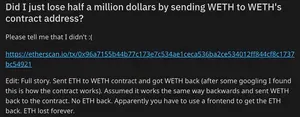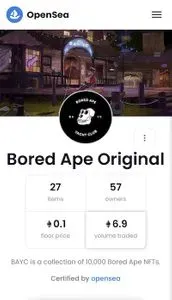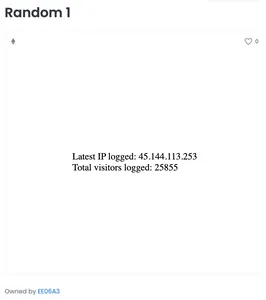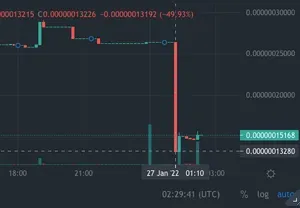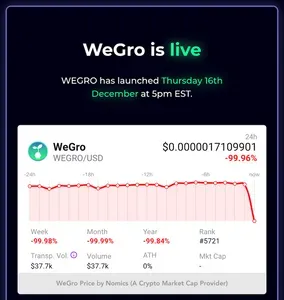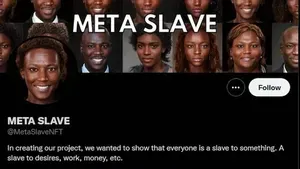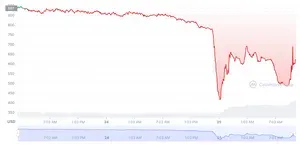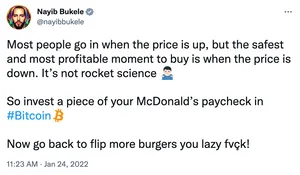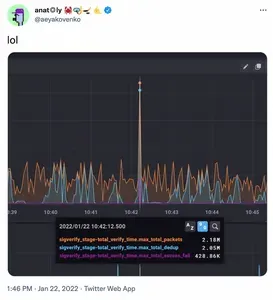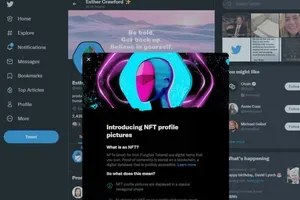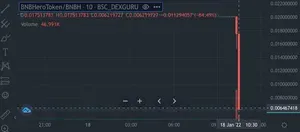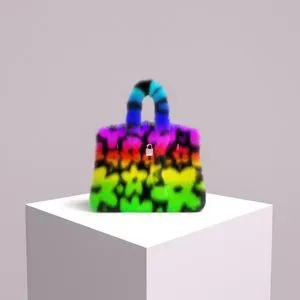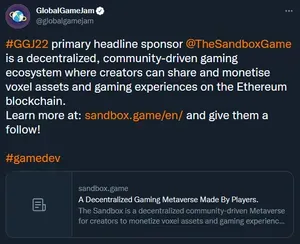Transaction history on Etherscan shows they were the 265th person to make this mistake. Most people did so with far smaller amounts of WETH, although another unfortunate trader lost 115 WETH (at the time valued at $360,000) on August 11, 2021. A total of 432 WETH has been irretrievably lost to this contract this way since July 2018 — currently valued at $1.1 million.
Trader loses $510,000 trying to convert funds between two currencies
Fake Bored Ape project pulls in $17,500 following high-profile endorsement of Bored Apes
Lazy Lion Ape Club rug pulls for 50 ETH ($125,000)
Khan Academy charity auction ends in blatant wash trade, and Khan Academy removing several former employees from alumni Slack channel for raising concerns
The auction ended on January 21, with a winning bid of 77 ETH (nearly $200,000) from ParagonsDAO, plus the promise of another 34 ETH ($87,000) donation from the DAO to Khan Academy. However, ParagonsDAO is a DAO created specifically to "play a key role in Parallel's governance" and "support the creation of an ecosystem for Parallel to thrive". Former Khan Academy employee S. M. Lundberg raised their concerns about the wash trading, and "KA elevat[ing] Parallel on its own channels to a largely underage and under-resourced user base" in the Khan Academy Slack, and was removed from the channel by Khan Academy founder Sal Khan. At least three other former employees were removed from the channel for criticizing the decision to engage with the NFT project, as was an additional person who protested the removal of those raising concerns.
Although the auction ended with more than $250,000 going to Khan Academy, it is likely that Parallel got the better deal here — Khan Academy is an enormous name to have promoting one's project. Sal Khan actively hyped the project in various spaces, including in an appearance on CNBC's Squawk Box.
87% of trades on LooksRare NFT platform reported to be wash trades
Wash trading is also a widespread tactic in the NFT space to artificially inflate the "value" of an NFT. Because it's relatively easy to create a pseudonymous cryptocurrency wallet, users will "sell" NFTs to themselves for large amounts to create the appearance of higher demand, and to try to convince other would-be buyers that the NFT is more valuable.
After OpenSea begins reimbursing users who lost money due to listings they didn't realize were still available, user "opensee_will_refund_ask_them" and others continue to exploit the widespread problem
Padawan DAO loses half its treasury through risky money management
OpenSea announces limits on free NFT minting, then reverses the decision the same day, after revealing that more than 80% of the items created through the feature were plagiarized, fake collections, or spam
Attacker exploits a bug in Qubit Finance allowing them to mint unlimited collateral and drain the platform of $80 million
People begin creating IP-harvesting NFTs to highlight the vulnerabilities in marketplaces and wallets
This is as good a time as any to remind you to use a VPN! Mullvad is a particularly good pick (#NotAnAd).
Following the Wonderland protocol disaster earlier this week, it is revealed that the pseudonymous chief developer has a long history of financial crimes and shady businesses
Wonderland founder Daniele Sestagalli had also been kept in the dark about the identity of his collaborator until finding out about a month ago. He opted to keep this information to himself, and claims it was because he believes in second chances. After the information became public, Sestagalli began a vote on whether Patryn should be replaced.
- Reddit thread on r/defi
- Twitter thread by zachxbt
- Twitter thread by Daniele Sestagalli
- "Stament[sic] on last Wonderland developments" by Daniele Sestagalli
- "QuadrigaCX cofounder Michael Patryn resurfaces— as 0xSifu, treasury manager of Wonderland", Amy Castor
- "Michael Patryn of QuadrigaCX is back — as 0xSifu from DeFi protocol Wonderland", David Gerard
Melania Trump apparently wash trades her own NFT
Creators of the play-to-earn game "Mercenary" rug pull for more than $760,000
New Zealand auction house Webb's invites buyers of historic glass negative and associated NFT to "make it permanently digital" by smashing the plate after they buy it
Sports fans face losses as IQONIQ platform liquidates and token value plummets
"Let's Go Brandon" coin suddenly drops 50% in value
WeGro token plunges in value as its developer apparently drains 1,000 BNB ($378,000)
"MetaSlave" project tries to sell NFTs of Black people
Investors suffer enormous losses as "cascading liquidations" tank the Wonderland protocol token price below its supposed intrinsic value
The $TIME tokens are issued against a set of assets that supposedly give the token an intrinsic value, and if the price drops below the backing price, the protocol uses the assets in their treasury to buy back the token to bring it back up to its "fair value". In the day following the crash, the protocol's founders spent several million dollars in buy-backs, which briefly boosted the token back up to trading at around $600.
The project's team reportedly suffered major liquidation losses themselves, with the founder Daniele Sestagalli losing $15 million and the chief developer "0xSifu" losing $1.6 million. Sestagalli briefly caused panic in the community when he set his 300,000+ follower Twitter account to private after tweeting "Dude I just woke up losing 10 m dollars", but set the account back to public shortly after. He retweeted a thread stating that "the internal struggle for growth is cut short by the willingness of some entities to 'eat' all that they'r able to, instead of 'cultivating' and sharing what would be exponential profits in the future."
Promised NFT game "Blockverse" rug pulls 500 ETH ($1.2 million)
John Lennon's son is delighted to be able to "auction off" items from his private Beatles collection without actually, you know, selling anything
Lennon said, "I've been collecting these personal items for about 30 years, and I was getting a bit fed up with them being locked away in a vault, where I've had to keep them because I didn't want them to get damaged... I actually felt very bad about keeping all that stuff locked away." Apparently photographing the items and displaying them digitally somehow was not possible until NFTs came along?
"Now go back to flip more burgers you lazy fvçk!" Nayib Bukele continues horrify those who come across his tweets and realize he's not just a Bitcoin bro but the president of an entire country
Naturally, he failed to mention the nearly 1,000 Bitcoin that he had purchased with taxpayer money since September 2021 at times that Bitcoin was above $50,000.
OpenSea users lose a collective $1.8 million to an issue allowing people to buy NFTs at low prices from old OpenSea listings the sellers thought they'd deleted
A software engineer investigating the incident attributed it to OpenSea's choice to do many of their operations off-chain to save on the expensive gas fees required for any Ethereum blockchain transaction, saying this introduced a disparity where updates were not reflected on-chain. Another person investigating the apparent issue reported that this looked to be the same "glitch" as earlier this month, where users tried to avoid paying the gas fees to delist their NFT sales by swapping them out of their wallet and back again, not realizing the listing would still be active when the NFT was returned.
OpenSea added an "Inactive listings" page to allow people to view listings that are still associated with NFTs that have been transferred out of the wallet, though the feature doesn't seem to have been widely publicized and it's not clear when it was released. They also later reimbursed users who suffered losses from this exploit, to the tune of about $1.8 million.
Solfire Finance rug pulls for $4.8 million
However, on January 23, the project developers drained around $4.8 million from the project before deleting the project's website and social media accounts.
Co-founder of the team behind CryptoPunks v2 sells all 40 of his v1 Cryptopunks shortly before the team announces they view them as worthless
A surgeon tries to sell an NFT of an x-ray of a terror attack victim without the victim's consent
A conservationist and wildlife photographer decides the way to battle people "exploiting nature for personal gain" is by minting NFTs on the Ethereum blockchain
NFT creators announce an NFT collection to "honor" Kurt Cobain
Investors on Solana-based defi platforms experience mass liquidations caused by yet another outage
Scammers set up a new server at the URL previously used by Ozzy Osbourne's NFT project, stealing thousands
McDonald's steals an artist's work to present to Twitter as a proposed NFT profile picture
MetaMask founder acknowledges they've failed to remedy an IP address leak vulnerability that's been "widely known for a long time"
Twitter launches special hexagonal NFT profile pictures, so now you don't even have to check a username for ".eth" to know who to avoid
OpenSea outage dampens Twitter feature launch, highlights centralization among popular web3 services
Kingfund Finance rug pulls for $141,000
Multichain publicly announces a vulnerability, and is quickly hacked by attackers using it
Mastercard spins a partnership with Coinbase as addressing "accessibility" and "inclusivity"
Once popular play-to-earn game BNB Heroes rug pulls after a period of inactivity from the team
Creator of "MetaBirkins" NFTs writes that he "won't be intimidated" by a trademark lawsuit from Hermès
I, for one, am very curious to see how the litigation plays out. In the meantime, the Rarible landing page for the connection displays an error message stating, "This user or item has been temporarily blocked from public access".
At least $34 million is stolen from users of Crypto.com
Although some users reported funds missing from their wallets, including one investor who reported that $16.3 million missing, Crypto.com announced that "All funds are safe". Over the next few days this was revealed to be untrue; as of January 20, the total estimated funds stolen from the platform had reached $30 million. Large amounts of stolen funds were quickly laundered through Tornado Cash, a popular crypto mixer.

